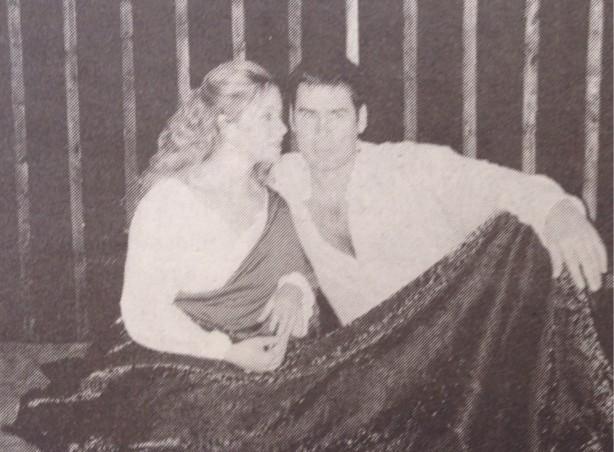By Kevin Ritchie
The definition of magical realism isn’t written in stone, but it is the kind of thing people obsess about.
A pretty good example of the term at work is how Denise Blinn and Gabrielle Kemeny came to be putting on a theatrical version of magical realist author Isabel Allende’s work.
In winter 1996, the two were holed up in a studio in the Image Arts building at Ryerson. Outside it was snowing heavily. As part of a joint film-theatre school project, Blinn, a film student, was assigned to direct a theatre piece starring Kemeny, a theatre student. Blinn was on time, but one of the key actors was an hour late because of the weather. So Blinn got to talking with Kemeny, who she’d never met, and each discovered they’d read every book by Allende, an exiled Chilean author, and adored her work.
Six years later, both of them still seem obsessed with magical realism. Sitting in the room upstairs at the Tarragon theatre where they’re rehearsing Two Words — a combination of two Allende short stories — they each talk hurriedly and excitedly about their play, which is set to open in less than a week.
“For Allende, it would be normal for me and Gabrielle to meet in a snow storm, talk about her book and then three years later, work on it,” Blinn says. “It’s destiny.”
Magical realism is grounded in the human world, not in fantasy, but things in the world appear unreal or dreamy. Coincidence or fate play a larger role in the plot. This kind of fiction is typically associated with Latin American authors such as Allende or Laura Esquivel who wrote Like Water for Chocolate. If you go to a website looking for a clear definition, expect to find a lot of rhetoric.
“It’s not crazy surreal but just beyond what’s possible,” says Kemeny.
The two contacted Allende, who agreed to give them the rights to convert her stories The Judge’s Wife and Two Words into a play. They wrote the script together and now Blinn is directing and Kemeny is starring in the production along with seven other actors.
Allende wrote the stories in Venezuela, while she was exiled from Chile (her uncle was Chilean president Salvador Allende, who was ousted in a CIA-assisted coup in 1973). Both stories have a hot, steamy feeling to them. They’re set in jungles and deserts in northern South America.
Two Words could also be interpreted as “magical melodrama” — there are bandits, a judge, a Colonel, a suicide and a woman thrown into a cave. Blinn and Kemeny each picked their favourite story from Allende’s book The Stories of Eva Luna and intertwined them. In their version, a woman named Belisa tells her lover the story of the judge’s wide in a flashback. Meanwhile, the same Belisa is a seller of words who winds up as a political speechwriter.
Two Words was a one-act play at 1999’s Summerworks festival. This time, the production will run longer and feature more prop and set design — Summerworks limits set up time to 14 minutes between plays.
This production is being put on by Cahoots Theatre, a company whose mandate is to promote diversity on and off stage. Two Words stars actors from Columbia, Venezuela, Cuba and Guyana.
Kemeny, a Montrealer with a Hungarian background, is Cahoot’s’ playwright in residence. Her parents fled Hungary during the 1956 communist revolution and she is now writing a play about the immigrant experience.
Kemeny has a teaching degree and tutors on film sets to make extra cash. She’s read Allende’s work amidst clattering construction and people running around but managed to tune the distractions out. She wants the audience to have the same experience at this play.
“There’s a lot of theatre that’s very talky and people wear what looks like their own clothes,” says Kemeny. “I love theatre that couldn’t possibly be TV or couldn’t possibly be something else.”













Leave a Reply